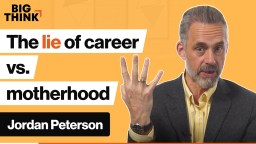MICHAEL KAUFMAN: If you went out onto the street and asked most men about their power, most men would look at you like you're crazy and, say, 'Power? Me? Are you kidding?' So why is there this disconnect between the real world of men's power, that still exists in spite of some real progress, and the experience of individual men? Well I think it's a few things. One is that when we have forms of privilege or power it tends to be invisible to us. As a man I don't have to think about certain things. I don't have to think about if I'm 30 years old going in for a job interview and someone thinking, 'Oh, 30 years old, he's probably going to become pregnant.' Even though, these days, of course, as a dad I'd be an equal parent. There's a lot of ways that men still have power it's often invisible to us.
But I think there's also something even more interesting, and that's what I think of as the paradox of men's power. The ways that we have defined men's power, the ways we raise boys to be men, come with a set of expectations that none of us can live up to. You know, we're supposed to be strong and powerful, in control, you know, make money, be the bread earner, have incredibly ripped bodies like a Marvel cartoon, not show feelings, not have feelings. And we punish boys, we punish boys for showing those feelings, for showing emotions. You know, a boy falls down and cries and you know we drag him back up, 'big boys don't cry, don't be a baby.' And so we just pummel boys and men for not living up to these impossible expectations and stereotypes of manhood. And yet as individual men we just assume, well, that's what a man is. And so there's this internal dialogue of self-doubt about making the masculine grade. And you know what that ends up being is it men end up being a bit torn apart. And I don't just mean metaphorically. I mean, you know, men die younger than women because we don't go for help, we don't go to doctors, we don't get emotional support. Men are more likely to be addicted to alcohol and other drugs, are more likely to be in prison, we're more likely to commit suicide, we're more likely to die of opioids. So all these different things are the result of a male-dominated society. It's a strange paradox. Can you imagine designing a world yourself in which your half of the species had more power, had more control, ran social institutions, random religions, ran the economy, and you set it up in a way that you'd also die younger, you'd also have all these personal failings?
Now there are some men these days who blame women on the plight the men are facing. There's some men who say, you know, the pendulum has shifted too far, men are the real victims. I don't buy it. I don't buy it at all. I don't think women are to blame for the pain, the plight, that men do feel. They've been brought up with a set of promises and expectations. You know, if you do all these things, if you just suck it up, if you just be a man you'll be rewarded. You know, you'll be work rewarded with jobs and sex and social acclaim or whatever it might be. Well, the world doesn't work like that. It doesn't work like that period, but it particularly doesn't work like that nowadays. The world has changed. And so men can't just come along assuming, well, it's still going to just all be in my favor. I mean, we've had this 8,000 or 10,000 year long affirmative action program for men, and that's the way it's been. You know, men haven't had to compete with half of the species for jobs, for positions of power or influence. We've gotten to rule the roost and call the shots. And the rug has been pulled out from under that. And it's not women to blame. It's not women to blame. It's the society that devised that whole mess in the first place.





